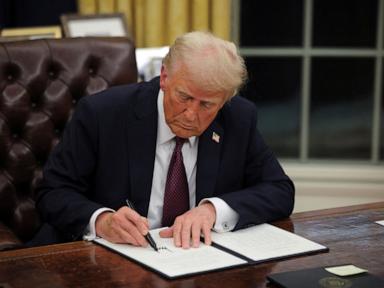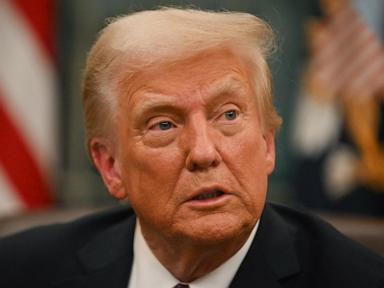Trump ordered the US to withdraw from the WHO. What comes next?

President Trump issued an executive order late Monday night withdrawing the U.S. from the World Health Organization (WHO).
This is the second time Trump has tried to pull the country out of the public health organization, having previously done somonths before the end of his first term.
Former President Biden ultimately rejoined the WHO before the end of the one-year waiting period required to leave the organization. It appears that the U.S. is more likely to complete its withdrawal this time — and become one of the few countries ever do so in the organization's nearly 80-year history — given that Trump issued his executive order on the first day of his term. But it is not yet clear what the decision might mean for the future of the U.S., the WHO and global public health if it does.
“There is just not a lot of clarity on this,” said Ashish Jha, dean of the Brown University School of Public Health and former White House COVID-19 response coordinator. “Part of it is because we are in uncharted territory. Nothing like this has happened in recent memory.”
What does the U.S. have to do to withdraw from the WHO?
Nothing in the WHO’s constitution bars a member from withdrawing from the organization, so the U.S.'s choice to pull out doesn’t appear to break international law.
There has been some debate over whether Trump would need approval from Congress to leave the WHO, however.
The U.S. joined the organization through a Joint Resolution of Congress in 1948. The resolution reserves the country's right to withdraw in the future, a 2020 report from the Congressional Research Service noted, but "does not specify" if that withdrawal can be effected by the president alone or the president acting jointly with Congress.
It does require the U.S. to give one year’s notice of the intention to withdraw from the WHO, and to pay all of its current financial obligations to the organization before leaving. This is a sizeable amount of money given just how much the U.S. funds the WHO: Nearly 20 percent of the organization’s roughly $6.7 billion biennial budget in 2023 came from the U.S., according to the WHO.
The Trump administration could face lawsuits against his order, complicating or possibly delaying the process.
Lawrence Gostin, director of the WHO Collaborating Center for National and Global Health Laws, confirmed to The Hill that he and his legal team are considering challenging the decision in court.
In a Monday post on X, Gostin argued that Trump cannot withdraw from the organization without congressional approval. "His decision is too catastrophic to be made without Congress and the courts," he wrote.
What would the withdrawal mean for global public health?
If the U.S. does leave the WHO, the effects on the organization would be "enormous," according to Gostin. The country has historically been the WHO's largest funder.
The United Nations health organization could potentially also lose all of the U.S. government staff that work there. Losing that amount of funding and a sizeable chunk of personnel could significantly weaken multiple public health initiatives within the institution, according to public health experts.
It could also make it harder for the WHO to identify and combat any new disease outbreaks or pandemics.
In the instance of an outbreak, the U.S. has historically sent scientists, researchers and other global health workers to wherever in the world it's occurring to collect data and to provide vaccines, treatments and tests. If the U.S. is no longer a part of the WHO, it will be much harder to do any of that work, making it easier for outbreaks to worsen, according to Jha.
“Beyond having a devastating effect there, it dramatically increases the likelihood that somebody with Ebola will get on an airplane and end up in Dallas or San Francisco,” he said.
What would it mean for the U.S.?
“Trump's decision will reverberate around the world, but the greatest damage is to U.S. national interests and security,” Gostin contended.
Among other things, he said, it would mean that all of the U.S. organizations that work with the WHO could struggle to do their jobs in the future. Excluding public health agencies like the Centers for Disease Control and Prevention from WHO initiatives would mean that they lose what he described as vital data collected by the organization on circulating viruses.
“That could put the U.S. at the back of the line when it comes to developing life-saving vaccines and treatments,” Gostin added. “Trump’s decision will not make America healthy, but will make us far more vulnerable and alone.”
The U.S. was one of the founding member states of the WHO in 1948 and has had a relationship with the organization since then. Very few countries are not WHO members, and there is only one UN member that is currently not a member state of the organization — Liechtenstein — so the U.S. would be largely on its own when it came to dealing with public health threats at home and overseas, health experts told The Hill.
U.S. pharmaceutical companies would lose “full and rapid” access to pathogen data needed for vaccine development, according to Gostin.
And in order to monitor diseases and outbreaks, the U.S. government would have to establish public health data-use agreements with essentially every country on the planet, according to Jha.
“We’re not going to want to go set up 193 bilateral relationships with 193 different countries for data sharing, that’s going to be a nightmare,” said Jha. “That’s not feasible and that’s one of the reasons the WHO exists.”
Can the U.S. return to the WHO?
It is possible for a former member of the WHO to return to the organization after leaving. Amid Cold War tensions at the WHO, the Soviet Union and a few of its satellite states in Eastern Europe withdrew from the organization in 1949 but returned in 1956.
In his Monday executive order, Trump said the U.S. was withdrawing from the WHO "due to the organization’s mishandling of the COVID-19 pandemic that arose out of Wuhan, China, and other global health crises, its failure to adopt urgently needed reforms, and its inability to demonstrate independence from the inappropriate political influence of WHO member states." He also contended the organization "continues to demand unfairly onerous payments" from the U.S.
Jha believes that if the WHO starts implementing reforms and makes a compelling case for why the U.S. should stay, there is a chance that Trump could rescind this order and “claim victory.”
Those reforms could potentially include creating term limits for leadership and allowing an investigator general, appointed from outside the WHO, to study and report on the effectiveness of the organization, according to Jha.
-

After Trump Reprieve, What Comes Next for TikTok?
The TikTok ban won’t be enforced until April, but there will be plenty of contentious negotiations between China, the U.S., and prospective buyers in the meantime.Inc. - 3h -

Why Trump's order withdrawing US from WHO could have massive implications
Public health experts say there could be massive implications after President Trump signed an executive order withdrawing the U.S. from the World Health Organization.ABC News - 6h -

Trump withdraws US from World Health Organization, finishing what he started
Trump initially removed the U.S. from the WHO in 2020, but Biden reversed his action before it went into effect.ABC News - 1d -
Trump’s Day 1 executive orders target EVs, inflation, immigration. Here’s what could come next.
After being sworn in, President Trump has a laundry list of executive orders.MarketWatch - 1d -

Trump signs order to withdraw U.S. from WHO
President Trump issued an executive order Monday night withdrawing the United States from the World Health Organization. The U.S. has historically been the largest funder of the Geneva-based ...The Hill - 1d -

Trump signs order to withdraw US from World Health Organization
President signs raft of executive orders to unpick Biden agenda and cut federal bureaucracyFinancial Times - 1d -

Trump signs order withdrawing from Paris Agreement
President Trump signed an executive order Monday evening officially beginning the withdrawal of the U.S. from the Paris Climate Agreement. The newly inaugurated president signed the order at an ...The Hill - 1d -

Trump signs order to withdraw US from Paris climate agreement for second time
On first day back as president, Trump signs letter giving notice to UN of US exit from treaty seeking to curb climate crisis effects. What executive orders did Trump sign on day one? Donald ...The Guardian - 1d -

Uncharted territory for the WHO if Trump withdraws US membership
WHO is ‘critical in protecting US business interests’, says CEO of firm that may see lean years if Trump carries out vow. The World Health Organization (WHO) could see lean years ahead if the US ...The Guardian - 4d
More from The Hill
-

Meta denies platforms are forcing users to follow Trump, Vance
Meta on Wednesday pushed back against claims its platforms were automatically forcing users to follow the Instagram accounts of President Trump and Vice President Vance following Inauguration Day. ...The Hill - 27m -

Biden’s outgoing letter to Trump: ‘May God bless you’
In the letter former President Biden wrote to President Trump, he wished him well during his second term and said, “may God bless you.” “As I take leave of his sacred office I wish you and your ...The Hill - 35m -

Mace mulls South Carolina governor's bid
Rep. Nancy Mace (R-S.C.) is mulling a run for South Carolina governor, her spokesperson confirmed to The Hill on Wednesday. Mace in an interview with The Associated Press said she's "seriously ...The Hill - 1h -

Trump White House begins remaking national security staff
White House national security adviser Mike Waltz has ordered a “full review” of personnel at the National Security Council (NSC), starting a process to weed out detailees at the agency who are not ...The Hill - 1h -

Panama protests 'threat' of force as Trump pushed to reclaim canal
The Panamanian government formally raised concerns with the United Nations over President Trump’s threats to retake the Panama Canal, noting any threat of force would violate rules. In a letter to ...The Hill - 1h
More in Politics
-

Prosecutors will have 'to sit on their hands' after Trump’s sweeping pardon of Jan. 6 defendants
President Donald Trump issued more than 1,500 pardons to people charged in connection to the Jan. 6 attack. NBC News Senior White House Correspondent Kelly O'Donnell, Justice Reporter Ryan Reilly ...NBC News - 26m -

Meta denies platforms are forcing users to follow Trump, Vance
Meta on Wednesday pushed back against claims its platforms were automatically forcing users to follow the Instagram accounts of President Trump and Vice President Vance following Inauguration Day. ...The Hill - 27m -

Attaching conditions to wildfire aid ‘is a dangerous precedent’: California Congressman
Rep. Ami Bera (D-Calif.) joins Meet the Press NOW with his reaction to Speaker Mike Johnson's (R-La.) call to condition disaster aid to California.NBC News - 29m -

Biden’s outgoing letter to Trump: ‘May God bless you’
In the letter former President Biden wrote to President Trump, he wished him well during his second term and said, “may God bless you.” “As I take leave of his sacred office I wish you and your ...The Hill - 35m -

Mace mulls South Carolina governor's bid
Rep. Nancy Mace (R-S.C.) is mulling a run for South Carolina governor, her spokesperson confirmed to The Hill on Wednesday. Mace in an interview with The Associated Press said she's "seriously ...The Hill - 1h